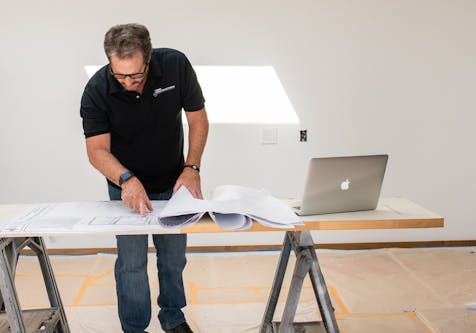The Complete Guide to Networking for Construction Professionals
Learn 13 ways to put down the hammer and pick up valuable industry connections

Learning how to network in construction is an essential part of creating success for businesses big and small. Networking comes naturally to some, while others might need a little support. Either way, this guide can help. Whether you’re outgoing or on the shy side, one or more of the 13 construction networking methods here is bound to help you expand your industry circle.
Why is construction networking important?
A big benefit of networking for construction professionals is that it puts your business in the minds of people who might refer you to clients, or whom you can call on to help with various project elements. But it’s about much more than that. A few other benefits of construction industry networking are:
- Getting inspiration for your own projects
- Staying on top of industry trends
- Keeping tabs on the competition
- Learning through discussions
- Honing your people skills
- Possibly joining with others to get bulk discounts on materials
- Socializing

13 ways to network in the construction industry
Everyone has their preferred way of meeting people, and now more than ever, online construction networking is just as viable as meeting in person. You’ll find chat rooms, online construction networking groups, lists of association members and more. As you read the list below, which methods speak to you the most? Start with those and then try the others if you’re inclined.
1. Nail your elevator pitch.
Opportunities to network can arise almost anytime and anywhere, so it helps to have a brief prepared description of your business. It should include at a minimum your name and business name, what specifically your business focuses on, and what makes your company great. If the listener is someone you’d like to know better, follow up by exchanging business cards and make a note to reach out again in the future. Good relationships are built over time, so following up is key.
2. Hit up trade shows.
From broad-based expos to smaller events, trade shows that foster construction business networking abound. Whereas conferences focus more on education and other forms of information sharing, trade shows offer the opportunity to explore products and services from vendors. Trade shows and conferences often are held jointly. Social events outside the show hours, such as cocktail mixers, dinners, and entertainment, often are available as well.
3. Attend conferences.
Focusing on talks more than sales, conferences offer many opportunities for construction industry networking in an educational setting. Some are for members of various associations only, while others are open to the public. A longtime favorite of residential construction pros is the National Association of Home Builders’ annual conference and show, IBS. Like trade shows, conferences typically offer formal and informal opportunities for networking beyond normal business hours.
4. Join construction associations.
Many professional associations provide advocacy and various kinds of resources in addition to opportunities for construction networking through bigger and smaller events for members. National organizations with local chapters in major cities include Associated Builders and Contractors (ABC), which has 22,000 members and an annual convention plus other events; Associated General Contractors of America (AGC), which has 27,000 member firms and provides an online calendar of events as well as a members directory; and American Institute of Constructors, which was founded more than 50 years ago and offers a wide range of construction industry networking opportunities.
Bonus tip: Some associations offer certification programs as well; see our Guide to Construction Certifications to learn more.

5. Take part in online meetups.
Some associations offer forums for networking, but many construction networking groups exist online outside of those. You can search for them on major social media platforms as well as popular websites devoted to discussion. And some websites offer a hybrid of online and in-person ways to engage in construction networking, such as Meetup.
6. Make your own social media connections.
Every time you post on social media, you’re creating chances for interaction. And sure, you could post just about your projects or staff and get some traction. But you also could post discussion prompts that get the ball rolling over wider ground, as well as fun quizzes or polls. Consider taking a timely construction-related topic, such as proposed legislation, people’s homes in the news, or projects that have just won awards, and turning it into a jumping-off point for commentary.
7. Help out in the community.
Charitable gestures don’t have to be grand to be valued — and valuable for you, both professionally and personally. Even something like repainting a community space or repairing a door at a nonprofit can build goodwill as well as provide construction industry networking possibilities. Remember, your networking doesn’t have to revolve just around other pros. Any time you make a good impression in a professional capacity, especially if you’re providing a service pro bono, you’re creating the possibility for positive word of mouth.
8. Talk shop on the job.
Any time you work with an employee or a subcontractor, whether it’s a regular hire or a one-job specialty service provider, it’s a chance to boost your company’s visibility and put yourself in mind for referrals as well as learn about industry trends and more. So when you get the chance, whether it’s during a lunch break or waiting for paint to dry, don’t be shy about talking up your company, especially if there are new developments or plans for it in the works.

9. Hand out business cards freely.
Printing business cards is so inexpensive and easy these days, with many printers offering industry-specific templates online, that it’s hard to imagine any strategy of networking for construction professionals without them. Keep some in your wallet, your car and maybe even your toolbelt so you’ll always have some at the ready when a networking opportunity arises. If you donate your services to a charitable organization’s auction, leave a small stack by the bidding sheet. If you have a physical street-facing office, you can even tack up an envelope with them so any potential clients passing by will be able to easily contact you.
10. Play the long game.
Relationships that last aren’t built in a day, and not all contacts you make are going to translate into new projects or anything else that immediately furthers your business. You also might be giving more than you’re getting in the beginning, such as with pro bono work. That’s OK! How to network in construction involves realizing that not all relationships will be mutually beneficial right away (or maybe even ever), and that treating new relationships in a transactional fashion can be off-putting. Since it’s hard to know at the time which networking seeds will flower, just be patient and realize that even just making a positive impression in general is good for business. Plus, as mentioned above, networking builds those people skills that are so valuable when working with clients.
11. Always be ready to network.
The golf course is famed as a place where deals are done, but countless other places for construction business networking exist. How about Trivia Night at the bar, your adult softball league, your kids’ sporting events or recitals, or any other place where you’re hanging out with people and making conversation? Just make sure to go easier on the shop talk at these kinds of social events than you would at an industry event, and gauge the interest of the person you’re talking with to make sure they’re OK with discussing business.

12. Keep all doors open.
Every client, subcontractor, friend, family member and more can potentially connect you with someone looking to hire or someone who can otherwise help your business. So maintaining good relations is a good idea. Touch base every now and then with those on your mailing list (if you don’t have a mailing list, now is a good time to start building one) by sending a template-based newsletter that showcases a recent project, a star employee and any company news. Consider sending out holiday cards to everyone if you don’t already. Send the most important people personal notes on special occasions such as a birthday or anniversary. And work to turn around any negative reviews as soon as you can.
13. Follow the proven paths.
Pay attention to which of your construction networking strategies seem to be paying off the most, so you can invest more time and effort where it counts. Ask potential clients how they heard about you — for your own records but also so you can send a nice thank-you note to the person who made the referral, if applicable. Showing tangible gratitude can help ensure that the referrals keep coming.
Bonus Tip
With these 13 construction industry networking ideas, you’ll be in good shape for getting out there and lengthening your roster of contacts. And remember that even trying just one or two can make a big difference! The next step is making sure to handle all the leads that come from your networking in a timely manner. Consider trying Houzz Pro, the all-in-one software for construction pros; it has a construction CRM feature that lets you import leads and helps you respond quickly, and you can try it free.
More resources:
Learn how to recruit in residential construction
Connect with other pros through a Free Premium Profile on Houzz

Want advice delivered to your inbox?
Unlock industry insights and updates for contractors and design pros
By signing up, I agree to the Houzz Terms of Use and Privacy Policy and that Houzz may use my information to contact me about relevant content, products, and services.





Join the conversation by commenting or asking a question below. The Houzz team reads every single comment, and we’ll get back to you by email if you need us!